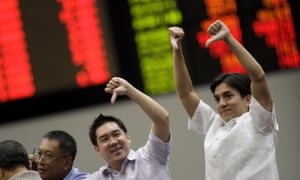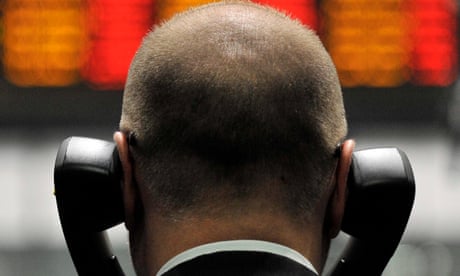By Reuven Brenner
The US and European financial crises have this in common: too much credit was
advanced at too low prices to households in the United States and to
governments in Europe. In the US, the recipients did not have either the
collateral or the prospect of revenues to pay back creditors. In Europe, the
governments, with their present institutions, cannot create enough taxed wealth
to pay back the debt with their current institutions, taxes and regulations.
In both cases, the recipients of the loans either lied through their teeth or
deluded themselves (and delusions can be powerful when they serve one's
interests). In the case of mortgage recipients in the US, few did any due
diligence about their future ability to pay or about the mortgage-backed bonds.
In Europe, the move toward the European Community and the euro started with
lies (or delusions of German rescues). Recall that the Italians called 1987 the
year of
il sorpasso, since suddenly 18% was added to their gross
domestic product (GDP). The politicians claimed that this number reflected part
of their undeclared, unmeasured incomes.
Why 18%? Because this was the number that allowed Italy to conform to the
European Community requirement of debt/GDP ratios. The European bureaucrats
were aware of much undeclared incomes in Greece too. Eventually they sued the
Greek government for the false national statistics.
The result? To this day in both countries some 30% of incomes are undeclared in
a variety of imaginative ways, often hidden by these countries' intricate
customs, traditions and systems of patronage.
The national governments will not have an easy time changing such deeply rooted
arrangements. Too many complex taxes, too many regulations, and too much
corruption "on the top" resulted in ingrained perceptions that governments are
wasting the money and that the courts are unreliable, rationalizing the culture
of tax evasion. Why should hard-working people pay taxes when politicians and
the rich get away with murder?
As it is in private life, start relationships with lies and they are unlikely
to last or to end well. No trust, no finance; diminished trust, finance at a
higher price. It is not rocket science.
But if all this was known, why were lenders willing to advance massive amounts
of loans to these irresponsible, unaccountable entities?
Whereas in the US the case can be made that it took some time until it dawned
on some that things were going awry, in Europe's case the issues surrounding
Italy and Greece were well known. It was no secret that the continent was
divided into "junk countries" and others where the tribe - the German one -
could be called on for sacrifices and fulfilling duties, as was the case after
the reunification.
Who made the mistakes that led to offering the loans to these profligate
entities, aggravating mispricing of credit around the world and failing to
correct the errors?
After all, the rationale for capital markets is simple: when all parties are
held accountable, they correct mispricing faster than any other institutions
that supply capital. There are only two other main entities that supply capital
in every society: families and governments. The first is unlikely to correct
mistaken allocation faster because of emotions. The second is unlikely to
correct mistakes faster than arms-length financial intermediaries because a
wide variety of political considerations get in the way.
So what went wrong in the presumably accountable financial institutions?
Improper fiscal, regulatory and monetary policies. When combined with political
considerations, however, none were considered "mistakes" by large segments of
academics, central bankers, and politicians.
China illustrates in an extreme way the main difficulty with the finding
solutions, but it is not dissimilar to what now confronts Europe too.
Most people agree that communism, as once practiced in the Soviet Union and
China, was a colossal mistake. Tens of millions of people were killed,
generations were made miserable, and talents and resources became severely
mismatched. How do you correct for such mistakes? What is the path from
totalitarian societies to more open ones backed by rule of law and equality?
There are no unique answers. There are no theories, no models, since the
countries do not have either the legal precedents or the personnel to create,
interpret and enforce them. Governments may emulate a successful country, but
that too can take a generation or two.
China bet on a strategy of keeping the monopoly of the communist party, but
allowing part of its population to integrate with the West. To achieve this
integration, they pegged their currency to the US dollar, thus allowing dollar
prices to guide the drastic restructuring. What was the alternative? Since
accounting, balance sheets, prices, costs under communism were all fiction, the
new government needed an anchor, and dollar prices served as such anchor.
Since wages in China were much lower than in the US, employment and exports
expanded quickly. The country rapidly accumulated trillions of dollar assets.
The Fed's low interest rate policy from 2004 and on distorted China's massive
flow of trade to the US and its purchasing of Treasuries.
One could make the point that if the Chinese Communist Party opened up its
domestic financial markets more rapidly, dispersing power and allowing
entrepreneurship to thrive, the financing of the housing bubble could have been
significantly mitigated, if not avoided, even with the pegged currency. Was the
US able to use its negotiating powers at the time to force China to open its
domestic markets more quickly? I believe so - though this option wasn't
pursued.
The main point though of the above example is not to regret some foregone
opportunity but to show that there are no models describing either how exactly
countries should correct their political mistakes or how other countries should
react while countries go through such transitions. There are no roadmaps and
general theories for successful transformation: using negotiating power
matters.
The European crisis
The financing of profligate, unaccountable governments, sanctioned by rating
agencies and the Bank of International Settlement in Basel as being "riskless",
brought us to the present situation. The solution for the eurozone required a
drastic change in domestic policies cajoled by the European Union. After all,
the EU knew all along about the extensive black and grey markets and the
intricate patronage. Solutions were known too: simplified taxes, simplified
regulations, more accountable governments.
Note that these solutions have very little to do with financial markets. They
are a matter of political leadership. The political and financial institutions
of China, Italy, Greece, and so forth shaped intricate institutions and habits
and will not be altered because some economist or politician disapproves of it
or devises some new technical models. Changing these is a matter of political
leadership.
Unfortunately, such leadership is today nowhere in sight. If it does not
emerge, bankruptcy, a distant second best, will bring about the changes. It is
a distant second best because it could involve an extremely disorganized
process, whose political outcome is unpredictable. What could then be done now
while we wait for the Club Med countries to put their houses in order?
Since the European banks are at the center of the present crises, the best
solution would be to emulate what happened in the US banking system in the
1990s. Namely, let them raise money by selling their loan book.
Banks would be much smaller. Ownership of non-investment grade loans would be
much more dispersed. If the US banks could diminish their ownership of such
loans from 80% in 1994 of their assets to 20% by 2009 (the balance distributed
in a variety of collateralized loan obligations), there is no particular reason
why Europe cannot achieve the same in much shorter time.
No need to implement a myriad of regulations. Disgorging debts from the zombie
banks would also mitigate the much discussed "too large" or "too
interconnected" to fail issue. Pension funds, insurance companies, and
sovereign funds could offer the capital for such purchases.
But this takes guts, which are lacking in both Europe and the US. Yet again, I
sound like Machiavelli waiting for his prince who never came.
Let's hope that he will emerge in 2012.
Reuven Brenner holds the Repap Chair at McGill University's Desautels
Faculty of Management. The article draws on his books Labyrinths of
Prosperity
and Force of Finance.


 Nerves are on edge as wickets tumble and it's your turn to bat next © Getty Images
Nerves are on edge as wickets tumble and it's your turn to bat next © Getty Images Captains and coaches can seek to arrest the collapse by talking to the remaining batsmen about their preparation and the importance of playing naturally © Getty Images
Captains and coaches can seek to arrest the collapse by talking to the remaining batsmen about their preparation and the importance of playing naturally © Getty Images

 57 Comments
57 Comments